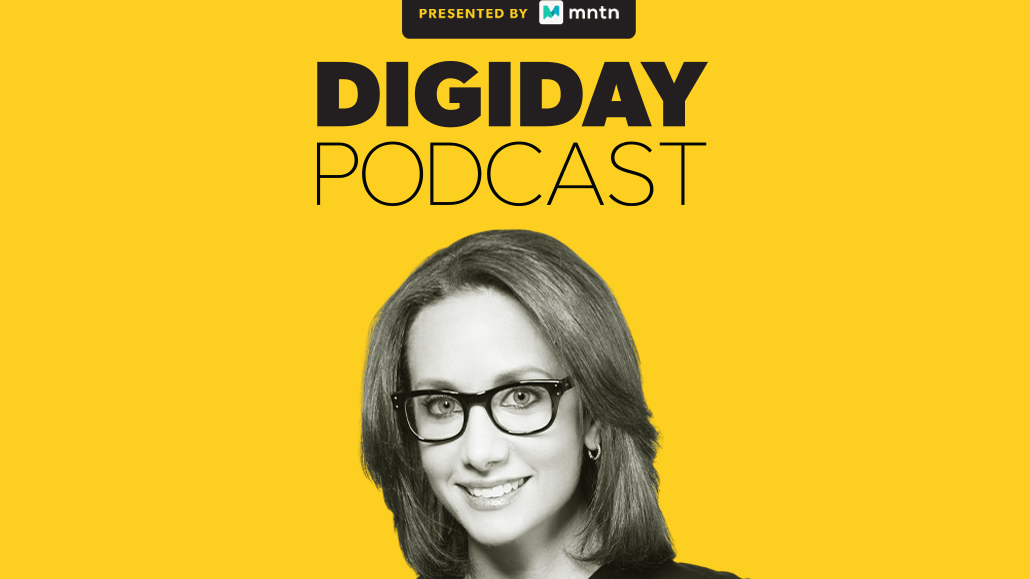Secure your place at the Digiday Publishing Summit in Vail, March 23-25
‘Becoming a direct-to-consumer company’: How Condé Nast’s Pamela Drucker Mann is focusing on innovation in 2022 after the best revenue year in a decade

For Condé Nast, 2021 was the best year the company has had in the past decade, according to global chief revenue officer Pamela Drucker Mann. And after a tumultuous 2020, that outcome was neither guaranteed nor expected.
As of mid November, the media company’s total global commercial revenue — including print — was up 20%, Drucker Mann said on the latest episode of the Digiday podcast. Specifically on the digital side of the business, revenue rose nearly 40% year over year, which she attributed much of to its new e-commerce business (up 46%), investing further into digital video, and shifting focus from audience targeting to contextual targeting in ad campaigns.
And thanks to all of that growth this year, Condé Nast is using 2022 to invest in “legitimately becoming the best, most refined, most sophisticated, direct-to-consumer company — not just an advertising company,” Drucker Mann said. This includes getting experimental with new businesses and projects, including NFTs, hosting events in the metaverse, and diving deep into live shopping.
Below are highlights from the conversation, which have been lightly edited and condensed for clarity.
An influx of RFPs
Our marketers are buying us in a lot of new ways [and] the way we monetize our audience is direct through our first-party data capabilities. I do think there’s something to be said — and we’re just at the beginning — for this shift away from audience targeting to contextual targeting. And it’ll be interesting to see how other publishers do in this moment in time. But I’ll be honest with you, I was just having a conversation with another client, I haven’t seen this kind of inbound ever in terms of just the amount of RFPs that are coming in right now. We’re starting to wonder, is some of this coming from these shifts in privacy and marketers needing to find new ways to find their customer? Which is obviously going to continue to be important to them.
A creator’s economy that bodes well for publishers
The other broader moment that’s happening is, it’s a creator’s economy. If you think about the pendulum in terms of just how marketers are prioritizing their dollars, this was already starting to happen before the privacy shift started last spring. Really looking at the full funnel, I think markers were starting to see the car was running out of gas a bit in terms of return on investment and were starting to refocus some dollars on building their brands.
Also, the funnels kind of collapsed with technology. The decision journey isn’t that much of a journey anymore. Creating want and desire and conversion can all happen in like three seconds. Because of that, marketers have been more focused on, “How do we get more gas in the tank? How do we get closer to content?” Everyone wants to be a content creator. And there’s a variety of reasons why content is driving commerce, [why] content is driving stickiness and engagement.
For us, as a content company, we’re well positioned, but I would say we were already kind of well positioned to be that solution to our marketing partners. Our entire focus is about building that relationship directly with our consumer, and because of that, we’re building an e-commerce relationship and building a stickier relationship around how we monetize our quality content directly to our consumer. So those are tools that we’re refining on behalf of ourselves. And so now we’re in a position to lend some of those tools back to our clients.
Finding fresh ways to rein in costs
There are some changes in the way that we think about cost. I think we were living at a time before the pandemic that felt very much like excess. I don’t think people were considering, “Do I need this? Or do I not?” It was just kind of always how things were. We’ve learned to move a lot faster [and] move with less. And when I say that, I mean really thinking about, “What do I need to do to get this done?”
We’ve just become more resourceful [and] with that comes intuitive savings, and just a better way of doing business. The idea of being able to work smarter, not harder, [such as] knowing that you have production teams on the ground in many different locations — does that mean you should be flying a new team over there, if you’ve already got a team that’s present? So it’s really given us a gift, to be honest, just more thoughtful approaches around how we think about spending.
More in Media

The case for and against publisher content marketplaces
The debate isn’t whether publishers want marketplaces. It’s whether the economics support them.

Urban Outfitters shifts its influencer strategy from reach to participation
Me@UO is Urban Outfitters’ new creator program leverage micro-creators with smaller, engaged communities that are passionate about the brand.

Media Briefing: Without transparency, publishers can’t tell if Google’s Preferred Sources feature benefits them
Six months in, Google’s Preferred Sources promises loyalty-driven visibility, but leaves publishers guessing at the traffic impact.








